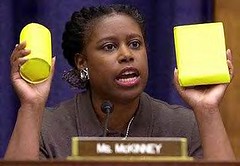
Former US Congresswoman from Georgia, Cynthia McKinney, holds up food packet and cluster bomb, both of which were being dropped on Afghanistan by the American military in late 2001.
Originally uploaded by Pan-African News Wire File Photos.
By Daniel Dombey in London and Demetri Sevastopulo in Washington
January 17 2007 17:40
Financial Times
The US and the UK are considering deploying more troops in Afghanistan, in the light of other Nato countries’ failure to send reinforcements.
Last September, General James Jones, then Nato’s top commander, called for the alliance’s 26 member countries to send 2,500 more soldiers to the turbulent south of the country following tougher than expected resistance from the Taliban insurgency.
But during the four subsequent months, only Poland has announced a large-scale deployment, accelerating plans to dispatch a 1,000-strong battalion. A few other countries have declared their readiness to help with airlifts, in the case of France, or to send companies of about 100 soldiers each, in the case of Bulgaria, Romania and the Former Yugoslav Republic of Macedonia.
That has left troops in the conflict-torn south and east of Afghanistan – principally US, British, Dutch and Canadians – without the support their commanders have demanded.
There are about 31,000 Nato troops in Afghanistan, with several thousand additional US soldiers.
This week, US commanders said they had asked the Pentagon for more troops and Robert Gates, the new US secretary of defence, who has been visiting Afghanistan, said he was sympathetic to their request. Diplomats said it was highly unlikely that soldiers in the field would be turned down by the new Pentagon chief.
Lieutenant General Karl Eikenberry, the US’s top commander in Afghanistan, said he had asked for 1,200 soldiers who are due to leave soon to stay to the end of the year.
Mr Gates acknowledged the request for more troops but declined to enter into specifics.
“It depends on different scenarios,” he said on Wednesday.
“Those are the kinds of decisions we’re going to have to look at.”
UK officials are also considering increasing British troops in Afghanistan this year, in line with British plans to reduce forces in Iraq from current levels of 7,100 soldiers to about 4,500.
Any US push to send more soldiers to Afghanistan will be a strain on the military’s resources, particularly in the light of President George W. Bush’s decision to send 21,500 more soldiers to Iraq.
But such a move would probably face less opposition on Capitol Hill than the planned “surge” in Iraq.
Many Democrats argue that the Bush administration has neglected Afghanistan because of its preoccupation with Iraq. Following her return from Iraq and Afghanistan this week, Hillary Clinton, a New York Democratic senator who is considering running for president in 2008, argued for the US to send more troops to Afghanistan.
“This is the great missed opportunity that I fear we’re going to stumble on, because Afghanistan is, so far, quite a success story,” Mrs Clinton said on Wednesday. “We should be putting troops into Afghanistan to be ready for what will be a spring offensive by the Taliban.”
The reluctance of other Nato countries, such as Germany, France and Spain, to send troops to the south and east of Afghanistan has also disappointed British and US officials who had hoped for much more support.
“There are basically two camps in Nato – the countries that emphasise the need for more military resources for Afghanistan and the countries that emphasise a greater political effort,” said a senior Nato diplomat.
Copyright The Financial Times Limited 2007
No comments:
Post a Comment